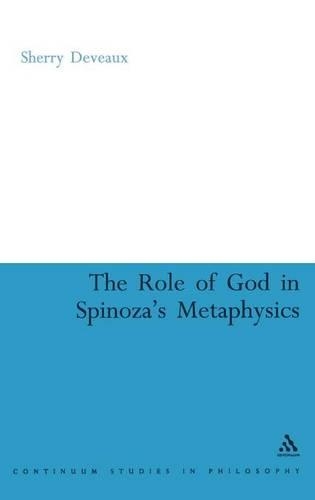
The Role of God in Spinoza's Metaphysics
(Hardback)
Publishing Details
The Role of God in Spinoza's Metaphysics
By (Author) Sherry Deveaux
Bloomsbury Publishing PLC
Continuum International Publishing Group Ltd.
26th February 2007
United Kingdom
Classifications
Tertiary Education
Non Fiction
Religion and beliefs
199.492
Physical Properties
Hardback
152
Width 156mm, Height 234mm
380g
Description
Baruch Spinoza began his studies learning Hebrew and the Talmud, only to be excommunicated at the age of twenty-four for supposed heresy. Throughout his life, Spinoza was simultaneously accused of being an atheist and a God-intoxicated man. Bertrand Russell said that, compared to others, Spinoza is ethically supreme, 'the noblest and most lovable of the great philosophers'. This book is an exploration of (a) what Spinoza understood God to be, (b) how, for him, the infinite and eternal power of God is expressed, and (c) how finite human beings can have a true idea of this greatest of all entities. Sherry Deveaux begins with an analytic discussion of these three questions, and an explication of three different views held by contemporary commentators on Spinoza. She then shows that the commonly held views about Spinoza are inconsistent with Spinoza's texts, especially his magnum opus, the Ethics. Next comes an analysis of topics in Spinoza that must be understood in order correctly to answer the three questions. For example, the notions of 'power' and 'true idea' are discussed, along with Spinoza's definition of the 'essence' of a thing, which is shown to be central to the discussion of Spinoza's God. Deveaux then claims that Spinoza defines God's essence as 'absolutely infinite and eternal power' and that, contrary to the commonly held view that God's essence is identical with the attributes (e.g., thought and extension), God's essence or "power" is expressed through the attributes.
Reviews
"Deveaux offers scholars a significant new interpretation of Spinoza's God that challenges and ultimately rejects the interpretations of Jonathan Bennett, Edwin Curley, Alan Donagan, H. F. Hallett, and Steven Parchment. She shows how these interpretations involve insoluble problems, while her interpretation, which is indebted to Michael Della Rocca, can avoid these problems. This is a stimulating work, particularly for those attracted by the profundity of the metaphysics and vision of God found in Spinoza's Ethics." -Michael Strawser, Philosophy in Review
-Mention. The Chronicle of Higher Education/ May 11, 2007
"This book is essential reading for anyone seeking to understand Spinoza's metaphysics." - Don Garrett, New York University * Blurb from reviewer *
"In my view, Sherry Deveaux has made the strongest case for the simplicity of Spinoza's God in the history of Spinoza scholarship."- Joel I. Friedman, Professor Emeritus, University of California, Davis * Blurb from reviewer *
"As such, it is an important contribution and one worth remembering in subsequent interpretations of Spinoza's account of God." - Steve Parchment, Journal of the History of Philosophy, July 2008 -- Steve Parchment * Journal of the History of Philosophy *
Author Bio
Sherry Deveaux earned her Ph.D. at the University of California, Davis. The author of articles on the history of early modern philosophy and contemporary metaphysics, she is currently a Lecturing Professor at Stanford University, USA.
